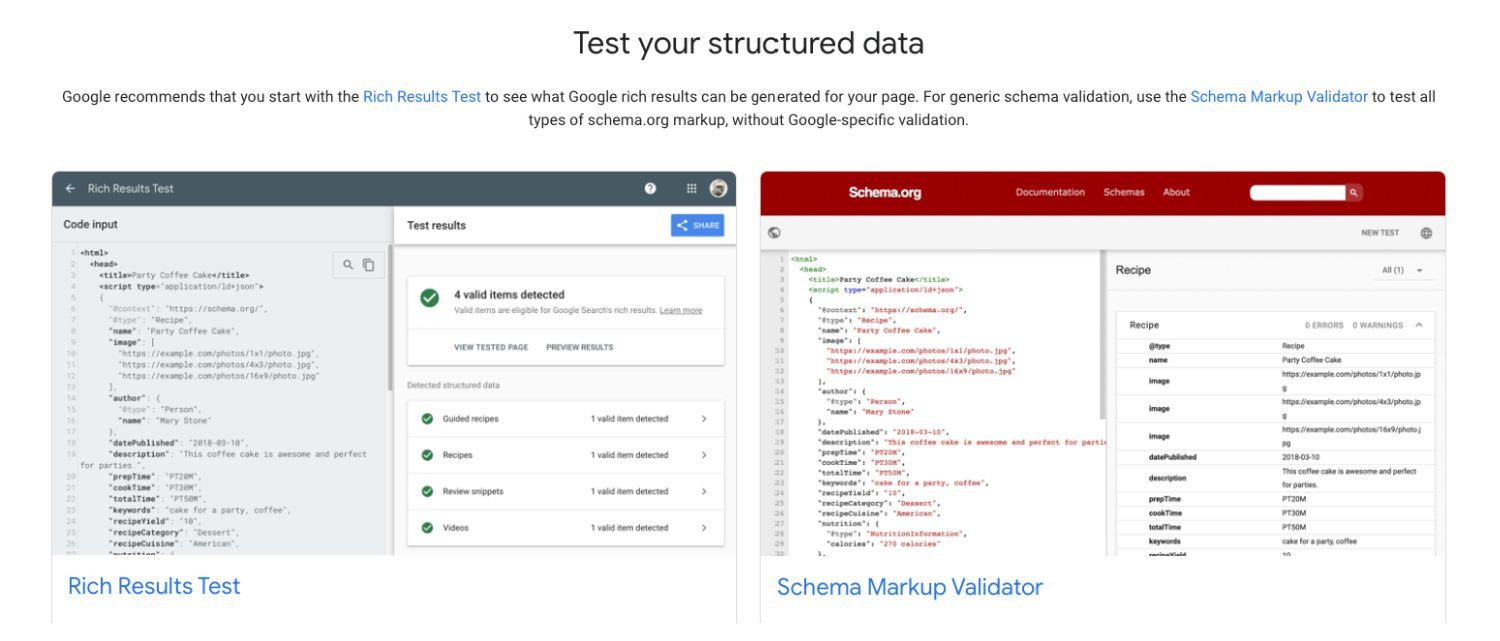CALL US TODAY! (404) 850-8333
What Is Schema Markup? A Comprehensive Guide to Structured Data
Are you looking to make your website stand out in search engine results? Have you ever wondered how some websites manage to display eye-catching visuals and detailed information directly in the search results? The secret lies in a powerful tool called Schema Markup. By the end of this blog post, you’ll understand “what is Schema Markup”, why it’s essential for SEO, and how to implement it on your website effectively.
We’ll guide you through the different types of Schema Markup, their impact on voice search, and the best practices for implementation. Get ready to unlock the full potential of your website and provide an enhanced user experience for your visitors by learning what is schema markup.
Key Takeaways
- Schema Markup is a code standard used to help search engines provide more detailed page information.
- It’s essential for SEM-SEO success, as it enhances rich results and increases CTR by providing users with relevant info.
- Implementing Schema Markup involves choosing the right type, using tools, and testing & validating your markup, following best practices is key!
Understanding Schema Markup
Schema Markup is a coding type that assists search engines in providing more detailed page information. It offers extra context to a webpage, simplifying content comprehension for search engines. Known as a code standard or structured data, it supports search engines in better understanding and classifying web content. This enables search engines to display more detailed and relevant information in the form of rich snippets, making your website stand out in search results and improving the overall user experience.
But how does Schema Markup work? It all starts with a unique language called semantic vocabulary, used to describe and categorize web content. This vocabulary is then implemented using structured data formats, with Schema.org being the industry-standard vocabulary for this purpose.
Semantic Vocabulary
Semantic vocabulary is the language used to analyze a sentence and break it down into its components, allowing search engines to interpret the content in a way that is easily understood and actionable. The Schema.org vocabulary has been developed specifically for this purpose, enabling website owners to add schema markup to their website and help search engines categorize web content more accurately.
Semantic vocabulary clarifies the content on a web page, allowing search engines to more accurately index and rank pages, which results in improved visibility and search results. In today’s competitive digital landscape, where vying for online space is intense, it’s vital to engage users’ attention for success.
Structured Data and Schema.org
Schema markup, a format known as structured data, uses Schema.org, the industry-standard vocabulary, for adding schema markup to websites. Structured data can be encoded in three different ways - RDFa, Microdata, and JSON-LD, all of which are based on the Resource Descriptive Framework. All these encoding options provide you with an effective way for search engines to optimize your website. JSON-LD (JavaScript Object Notation for Linked Data) is the recommended encoding type, as it’s lightweight, easy to read, and integrates seamlessly with web pages.
Implementing schema markups can be done on an entire website or specific pages, depending on the content management system used. For instance, Breadcrumbs Schema Markup, based on JSON-LD, can help both users and search engines understand the structure of a website, ensuring that essential information is readily available and easily accessible.
The Importance of Schema Markup for SEO
The substantial impact of Schema Markup on SEO is one of the key reasons for its implementation. By enhancing rich results, Schema Markup:
- Makes search results more visually appealing and informative
- Increases the likelihood of users clicking through to your website
- Can lead to improved click-through rates and search rankings
- Gives your website a competitive edge in search engine results
Additionally, you can use tools like Google Search Console to evaluate the success of your Schema Markup efforts, providing valuable insights into web traffic and conversions. Incorporating schema is a tactic that many professional SEO services utilize.

Enhanced Rich Results
Enhanced rich results provide users with more specific and useful information directly on the search results page of major search engines. This increases the chances of them clicking and engaging with your website. For example, when searching for something like “New York concerts,” users will be presented with rich results that display information such as dates, names of shows, and venue locations, all thanks to the schema markup code.
The benefits of enhanced rich results include:
- Providing more information
- Giving your website extra visibility and space on the search results page
- Increasing the likelihood of being the only thing visible on the screen and capturing the user’s attention
- Helping reduce customer support costs
- Ensuring that your content reaches the right audience.
Improved Click-Through Rates
Implementing Schema Markup can lead to improved click-through rates (CTR), as users are more likely to click on search results that provide them with the information they need. For example, structured reviews in Schema Markup help Google display the highest-rated recipes at the top of search results, making it more likely for users to click on those results.
Offering more relevant and detailed information through Schema Markup and crafting an effective meta description effectively grabs users’ attention and encourages engagement with your website. This not only increases your website’s visibility but also helps establish trust and credibility with your target audience.
Common Types of Schema Markup
There are numerous types of Schema Markup available, but some of the more common ones include Organization and Local Business, Product and Review, and Event and Recipe. Each of these types provides specific information that enhances search results and improves the user experience.
Comprehending the varying types of Schema Markup and their associated benefits is vital for the effective implementation of structured data on your website. In the following subsections, we’ll delve deeper into these common schema types and their advantages.
Organization and Local Business
Organization and Local Business Schema Markup helps improve brand visibility and provides essential business information directly on search results pages. This type of Schema Markup can be used to display information about a business, such as its name, address, contact info, and opening hours. It can also be used to provide details about a local business, like its location, opening hours, and contact details.
Implementing Organization and Local Business Schema Markup guarantees ready availability of your business information for users in search of your products or services. This not only helps attract potential customers but also establishes trust and credibility with your target audience.
Product and Review
Product and Review Schema Markup is a powerful tool for displaying important product details and customer reviews on search results pages. This type of Schema Markup can provide information about a product, such as its name, price, availability, and reviews. It can also be used to display information about a review, like its rating, author, and date.
Utilizing Product and Review Schema Markup allows you to:
- Showcase your products and services effectively
- Foster trust with potential customers
- Display customer reviews and ratings
- Influence users’ purchasing decisions
This type of data markup is essential for online businesses, as it allows you to add markup to your website effectivel
Event and Recipe
Event and Recipe Schema Markup is designed to provide detailed information about events and recipes, attracting potential attendees and users interested in cooking. With this type of Schema Markup, you can display information about an event, such as its name, date, location, and description, making it look like an attractive option for potential attendees. Similarly, you can provide details about a recipe, like its ingredients, cooking time, and nutrition information.
Not only does implementing Event and Recipe Schema Markup enhance your search results, but it also guarantees your content reaches the appropriate audience. By providing accurate and relevant information, you can effectively engage users and drive more traffic to your website.
Implementing Schema Markup on Your Website
With a grasp on the benefits and types of Schema Markup, you’re ready to implement it on your website. The process involves choosing the right schema type, using schema markup tools, and testing and validating the markup. By following these steps, you can ensure that your schema markup is correctly implemented and free of errors, leading to better search results and user experience.
In the next few subsections, we’ll guide you through the process of implementing Schema Markup on your website, offering tips and best practices to help you succeed.
Choosing the Right Schema Type
Selecting the right schema type is crucial for providing accurate and relevant information to search engines and users. There are nearly 800 types of schema markup available, making it essential to choose the one that best fits your website’s content.
To select the right schema type, consider using JSON-LD, which is the recommended format for adding structured data to a website. Additionally, follow the instructions for the schema type available on schema.org to ensure that your markup is compliant and effective.
Using Schema Markup Tools
Schema Markup tools, such as generators and validators, can simplify the process of implementing and testing schema markup on your website. These tools allow you to generate HTML for Schema Markup, test and validate your markup, and optimize it for SEO.
Some popular Schema Markup tools include:
- Google Structured Data Testing Tool
- Google Markup Helper
- RankRanger
- Schema.org Validator
- Technical SEO Schema Markup Generator
- RankRanger Schema Markup Generator
- Schema.dev
By utilizing these tools, you can ensure that your schema markup is correctly implemented and error-free.

Testing and Validating Schema Markup
After implementing Schema Markup on your website, it’s important to test and validate it, ensuring its correct setup and absence of errors. This can be done using various tools, such as the Schema.org schema markup validator or the Rich Results Test provided by Google.
In addition to testing and validating your schema markup, it’s crucial to monitor its impact on search rankings and click-through rates. By regularly evaluating the effectiveness of your schema markup and making any necessary adjustments, you can continue to improve your website’s search results and user experience.
Schema Markup and Voice Search
With the rising popularity of voice search, Schema Markup plays an important role in aiding search engines to comprehend and provide precise information for voice-activated queries. By implementing Schema Markup, you can ensure that your website is optimized for voice search and that users receive the most relevant information when using voice-activated search features.
Local Business Schema Markup, for instance, can be particularly beneficial for voice search, as it helps search engines display essential business information in response to voice queries. By optimizing your website for voice search using Schema Markup, you can reach a wider audience and provide a better user experience.
Best Practices for Schema Markup Implementation
Adhering to best practices is vital to ensure the successful implementation of Schema Markup on your website. First, use the recommended JSON-LD format for adding structured data to your website, as it is lightweight, easy to read, and seamlessly integrates with web pages.
Regularly updating and maintaining your schema markup is also crucial to ensure that the information provided is accurate and current. Additionally, monitor the impact of your schema markup on search rankings and click-through rates to ensure that it is effectively driving traffic and engagement.
At ClickReady Marketing, we specialize in integrating schema markup into your website through various methods. This includes local business schema, logo, video markup, FAQ markup, and the "sameAs" schema. Our focus is always on enhancing your site's keyword ranking, especially for featured snippets. We offer a range of SEO packages tailored to meet your business needs.
Summary
In wrapping up, Schema Markup stands out as a crucial asset for amplifying your website's presence in search results and elevating the user experience. By grasping the diverse Schema Markup types, ensuring its accurate implementation, and adhering to the recommended practices, you can heighten your website's visibility, increase click-through rates, and fine-tune your content for voice searches. Harness the power of Schema Markup and pave the way for digital triumph. Call your local Atlanta SEO company today, Click Ready Marketing,
Frequently Asked Questions About Schema Markup
-
Why is schema markup important?
Schema Markup is an invaluable tool that helps search engines better understand and display your content, leading to increased visibility in organic search and higher click-through rates. This ultimately translates into more organic traffic for your website.
-
What is the purpose of JSON schema markup?
JSON schema markup helps search engines understand the content of web pages by providing a semantic vocabulary for them to categorize it. This allows them to deliver the most accurate search results.
-
What are some common types of Schema Markup?
Common types of Schema Markup include Organization and Local Business, Product and Review, and Event and Recipe, making them easy to implement for any online business.
-
What is the relationship between Schema Markup and voice search?
Schema Markup is essential for voice search, as it helps search engines understand and provide accurate information for voice queries.
LOCATIONS
CORPORATE OFFICE / MAILING ADDRESS
131 PROMINENCE CT. STE 210,
DAWSONVILLE, GA 30534
CUMMING SEO OFFICE:
410 PEACHTREE PARKWAY, BUILDING 400 SUITE 4245 CUMMING, GA 30041
Phone: 404-850-8333
ATLANTA SEO OFFICE:
1155 MT. VERNON HIGHWAY NE, SUITE 800,
ATLANTA, GA 30338
Phone: 678-820-7407
ALPHARETTA SEO OFFICE
5815 Windward Pkwy, Ste302
Alpharetta, GA.
Phone: 404-923-0015
ALSO PROVIDING:
QUICK LINKS
All Rights Reserved | Click Ready Marketing




